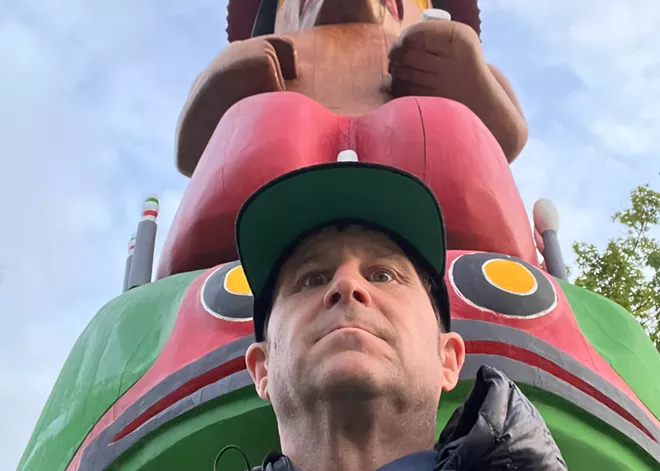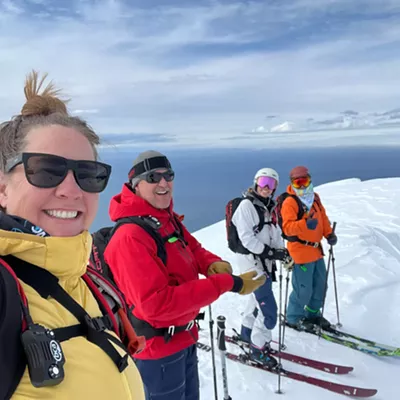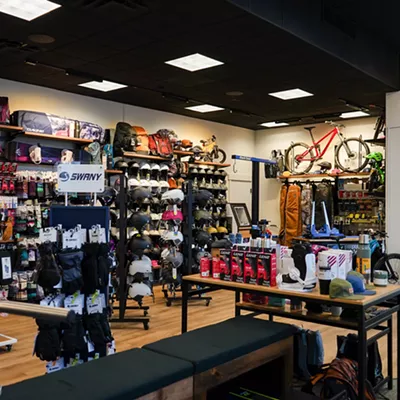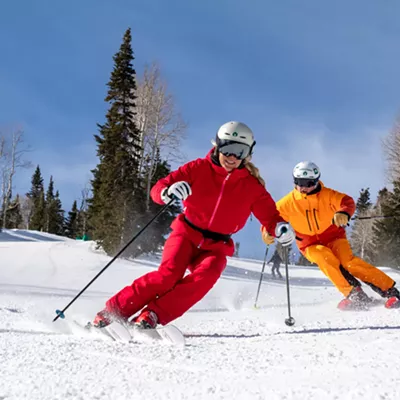
"When I was a kid, I always told myself if I was ever to start a band, I was going to call it the Powell Movement, and the first album would be called Because We're The Shit. That just always stuck with me."
That's Mike Powell of the Powell Movement, what I consider the best weekly skiing podcast out there. The Powell Movement talks with the Who's Who of the ski industry — past, present and future. I started listening to the Powell Movement a few years back when I was painting the inside of my house. I found myself binge-listening, sucked into all the little backstories on his guests. His podcasts made my paint job go by fast.
One thing I quickly learned is that Powell doesn't sugarcoat his questions. Yeah, many of his questions are the typical "where'd you grow up, how'd you start skiing," but he digs deep and sometimes asks uncomfortable questions. One of the first podcasts I listened to was a two-parter with Jeremy Nobis, a former U.S. Ski Team downhill skier and a guy who made a huge name for himself in Big Mountain skiing.
In fact, Nobis changed the game of Big Mountain skiing. Back in the '80s, '90s and even early 2000s, when skiing a big open Alaskan face, pro skiers would ski a run like that with 20 to 40 turns. Not Nobis. He put his downhill training and knowledge to work and tackled these steeps full throttle with five or six turns. His attitude also rolled into Nobis' day-to-day life with hard partying and running from the cops — so much so that he found himself in jail and rehab several times.
Powell wasn't afraid to ask Nobis the tough questions about his past, his addictions and his dark side. As a listener, there have been times I was uncomfortable, but I wanted to hear Nobis' story, good or bad. Powell's the guy to get the story.

Powell grew up an average kid plunked into the elite outskirts of Washington, D.C.
"My dad was a home builder, but all my friends were different. They were all in government it seemed. Dan Quayle's kid, the Scalias' kids went to my high school. My history teacher was Tom DeLay's wife. My best friend Johnny, well, his dad left the government to deal arms in Budapest," Powell recalls.
Powell started skiing by age 5, spending every weekend with his family in the Blue Ridge Mountains of Virginia at Wintergreen Resort.
"Every other year, we would go out to Colorado on ski vacation with my family and then later on with my friend's family, whose parents had a condo in Beaver Creek. [Then] I went every spring break and Christmas for about five or six years."
Powell was hooked, and he got his start in the ski industry with K2 as a brand ambassador for inline skates in Seattle. He quickly moved up, but "then the bottom dropped out on inline skating," he says. "K2 laid off everyone but two people in that division. I was one of the two. That was three months after I'd moved my whole life to Seattle."
Working at K2, Powell became good friends with the crew who was running the K2 ski division. His roommate at the time was K2 graphic artist Ryan Schnee.
"Anytime one of K2's ski pros would come into Seattle, they would end up staying at our house. I wouldn't call it a party house, but it was a party house. I'd say, over the years, we had probably 30 different athletes stay with us, and I became good friends with them all."
With change in the inline industry Powell moved over to the ski side of things in 2004, then moving up to U.S. marketing manager for K2 skis. During that time, lots of changes were happening with K2, including the sale of the company. After 15 years, Powell walked away, trying different things, ultimately doing marketing for a national craft brewery.
"People have always opened up to me for some reason," says Powell. "I have a weird way of questioning people when I meet them. I want to learn about them. One time my wife had a friend over, and I was just interrogating her, my wife's like, 'God, you should just start a podcast.'"
On Father's Day a few years back, Powell's wife bought him a podcast starter kit.
"It was all really garbage gear," he laughs. "But you know what? With nothing else going on in my life, I decided to quit that job and start a podcast. And that's it. I rolled the dice, and it has kind of worked out."
When it comes to research on his guests, Powell is diligent about getting the lowdown, so much so I think he could be a private investigator. He typically spends about 10 hours researching each of his guests. Whether it's going through their social media or getting on the phone and making calls, Powell finds those stories that haven't been told before.
With close to 370 episodes in his library, the Powell Movement has definitely created a following. Whether it's talking with guests like Glen Plake, Jonny Moseley, Tanner Hall, Scot Schmidt, Jeremy Jones, Jeff Ament from Pearl Jam, Gerry Lopez... the list of high-profile guests goes on and on.
"The way I look at it, with these interviews, I'm not telling stories about myself," he says. "It's all about the person I'm interviewing and their role in the sport, how they came up through it and the impact they've had on it... every different week is just a different little nook and cranny of the history of these sports."
Sometimes these history lessons or backstories come through what Powell calls "Inappropriate Questions." This is where a close friend or associate of the guests asks, you guessed it, an inappropriate question. They can be damn funny, like the episode with the ski company president whose business lunch in Japan went awry. Apparently, the sushi didn't agree with him and he had to make a mad dash to the toilet only to find it was one of those that was just a hole in the ground. For the next few minutes, you get to listen to this guest describe how he had something that rhymes with "Powell Movement," destroyed his pants and had to wash them right there in the bathroom sink, only to do the walk of shame and return to the business meeting with his pants soaking wet.
By the time the Powell Movement hits episode 1,000, there will be a great understanding of where the sport of skiing has come from, from a '70s hot-dogger's perspective all the way through the modern freeriders of today.
When you listen to Powell's weekly podcast, you can tell he takes pride in his work.
"It's cool telling these stories," he says. "I really enjoy helping these people tell their stories better than they told them anywhere else. I take pride in them, taking pride in listening to them and sharing them with other people. I think that's the coolest part of it." ♦
Bob Legasa has written for Snowlander since 1994. He's also a Hayden-based videographer, TV producer and snowsports event promoter with his Freeride Media company.




















